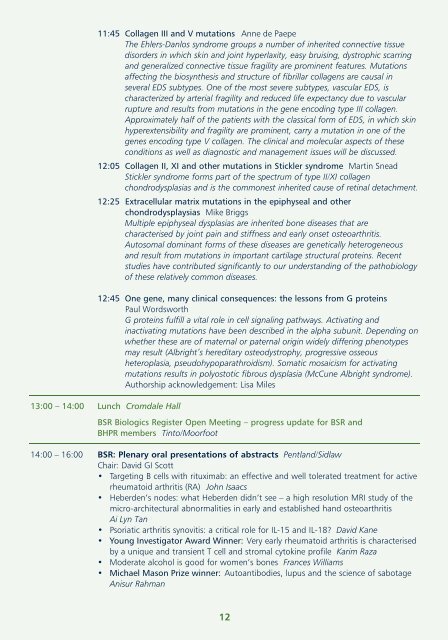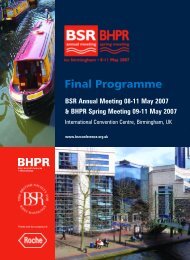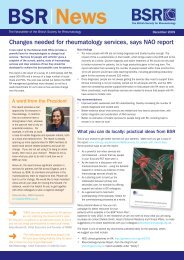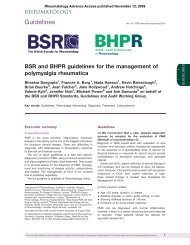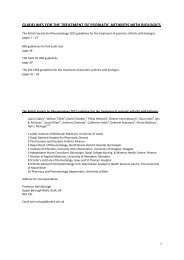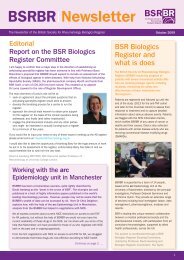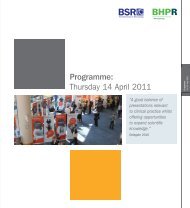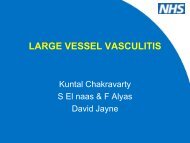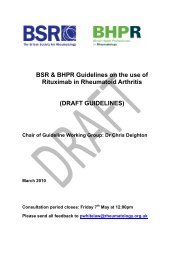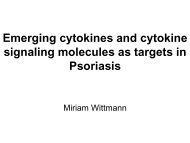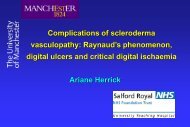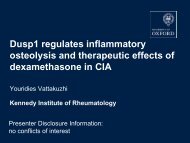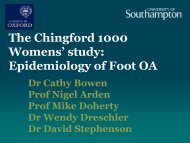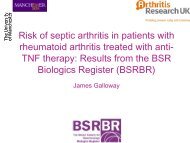View conference programme - The British Society for Rheumatology
View conference programme - The British Society for Rheumatology
View conference programme - The British Society for Rheumatology
Create successful ePaper yourself
Turn your PDF publications into a flip-book with our unique Google optimized e-Paper software.
11:45 Collagen III and V mutations Anne de Paepe<br />
<strong>The</strong> Ehlers-Danlos syndrome groups a number of inherited connective tissue<br />
disorders in which skin and joint hyperlaxity, easy bruising, dystrophic scarring<br />
and generalized connective tissue fragility are prominent features. Mutations<br />
affecting the biosynthesis and structure of fibrillar collagens are causal in<br />
several EDS subtypes. One of the most severe subtypes, vascular EDS, is<br />
characterized by arterial fragility and reduced life expectancy due to vascular<br />
rupture and results from mutations in the gene encoding type III collagen.<br />
Approximately half of the patients with the classical <strong>for</strong>m of EDS, in which skin<br />
hyperextensibility and fragility are prominent, carry a mutation in one of the<br />
genes encoding type V collagen. <strong>The</strong> clinical and molecular aspects of these<br />
conditions as well as diagnostic and management issues will be discussed.<br />
12:05 Collagen II, XI and other mutations in Stickler syndrome Martin Snead<br />
Stickler syndrome <strong>for</strong>ms part of the spectrum of type II/XI collagen<br />
chondrodysplasias and is the commonest inherited cause of retinal detachment.<br />
12:25 Extracellular matrix mutations in the epiphyseal and other<br />
chondrodysplaysias Mike Briggs<br />
Multiple epiphyseal dysplasias are inherited bone diseases that are<br />
characterised by joint pain and stiffness and early onset osteoarthritis.<br />
Autosomal dominant <strong>for</strong>ms of these diseases are genetically heterogeneous<br />
and result from mutations in important cartilage structural proteins. Recent<br />
studies have contributed significantly to our understanding of the pathobiology<br />
of these relatively common diseases.<br />
12:45 One gene, many clinical consequences: the lessons from G proteins<br />
Paul Wordsworth<br />
G proteins fulfill a vital role in cell signaling pathways. Activating and<br />
inactivating mutations have been described in the alpha subunit. Depending on<br />
whether these are of maternal or paternal origin widely differing phenotypes<br />
may result (Albright’s hereditary osteodystrophy, progressive osseous<br />
heteroplasia, pseudohypoparathroidism). Somatic mosaicism <strong>for</strong> activating<br />
mutations results in polyostotic fibrous dysplasia (McCune Albright syndrome).<br />
Authorship acknowledgement: Lisa Miles<br />
13:00 – 14:00 Lunch Cromdale Hall<br />
BSR Biologics Register Open Meeting – progress update <strong>for</strong> BSR and<br />
BHPR members Tinto/Moorfoot<br />
14:00 – 16:00 BSR: Plenary oral presentations of abstracts Pentland/Sidlaw<br />
Chair: David GI Scott<br />
• Targeting B cells with rituximab: an effective and well tolerated treatment <strong>for</strong> active<br />
rheumatoid arthritis (RA) John Isaacs<br />
• Heberden’s nodes: what Heberden didn’t see – a high resolution MRI study of the<br />
micro-architectural abnormalities in early and established hand osteoarthritis<br />
Ai Lyn Tan<br />
• Psoriatic arthritis synovitis: a critical role <strong>for</strong> IL-15 and IL-18? David Kane<br />
• Young Investigator Award Winner: Very early rheumatoid arthritis is characterised<br />
by a unique and transient T cell and stromal cytokine profile Karim Raza<br />
• Moderate alcohol is good <strong>for</strong> women’s bones Frances Williams<br />
• Michael Mason Prize winner: Autoantibodies, lupus and the science of sabotage<br />
Anisur Rahman<br />
12


